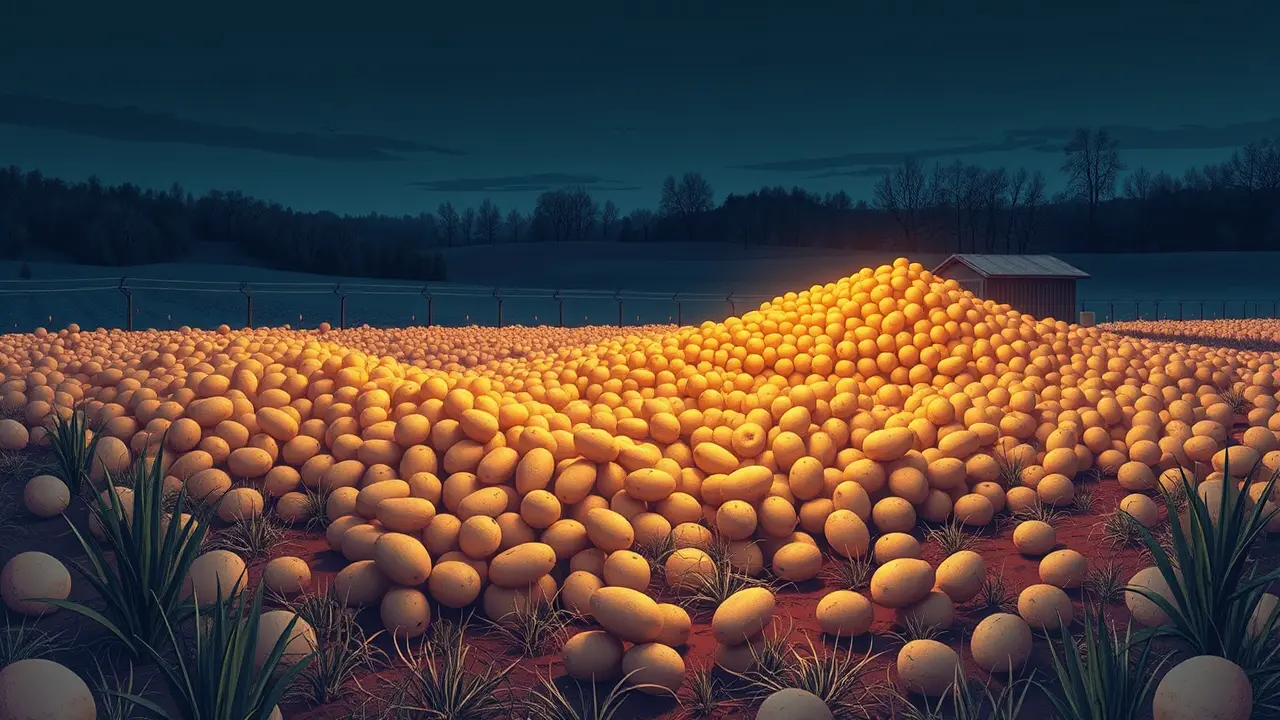Viral hoax leads to massive potato theft from farmer.
It began, as so many modern tragedies do, with a whisper on the internet, a digital Chinese whisper that spiralled into a devastating, real-world consequence for a man known only as Piotr. In the quiet, rural expanse of Dąbrowica, in Poland’s Podkarpacie region, Piotr had just completed the back-breaking, season-long labour of harvesting his potato crop, a yield of 150 tons that represented not just food, but his livelihood, his security, his entire year's investment of sweat, hope, and capital.He had stored it, this hard-earned bounty, with the quiet anticipation of a man who has worked in rhythm with the land, only to wake one morning to a scene of utter desolation. A malicious, baseless rumour had taken root on Facebook, spreading through local groups with the virulent speed of a digital blight, claiming that Piotr was giving his potatoes away for free.There was no truth to it; he had simply been navigating the common agricultural challenge of finding buyers in a fluctuating market. But by sunrise, a steady stream of cars and trucks, filled with people who had seen the post and acted without question, had descended upon his farm.They came not with malice, perhaps, but with a sense of entitled opportunity, and they picked his fields and storage clean. They took everything.The sheer scale of the theft—150 tons—is a number that feels almost abstract until you picture it: the weight of perhaps twenty-five full-grown elephants, the sustenance for thousands of meals, the entire economic output of a small family farm, all gone in a few hours of frenzied, misguided action. This incident is a stark, painful parable for our hyper-connected age, a story that speaks less about traditional crime and more about the new social contract, or lack thereof, that governs our online interactions.It forces us to confront uncomfortable questions about collective responsibility and the erosion of verification. What compels hundreds of individuals to act on a single, unverified social media post? Is it a pervasive distrust of official channels, a latent desperation, or simply the intoxicating allure of getting something for nothing, a digital-age gold rush where ethics are the first casualty? I’ve spent years interviewing people about the fabric of their daily lives, and a recurring theme is the dissonance between our online and offline selves; the screen creates a perceived distance, a moral buffer that makes actions feel less real, less consequential.For those driving to Piotr’s farm, they were perhaps just following a lead, seizing a chance. For Piotr, it was the obliteration of his annual income, a violation that cuts deeper than the mere financial loss.He now faces a mountain of debt for seeds, fuel, and equipment, with nothing to show for it. The psychological toll is immeasurable—the feeling of powerlessness against an anonymous, distributed crowd, the betrayal by a community he is a part of, the shattering of the fundamental farmer's faith that your work, once materialized from the soil, is secure.Historically, rural communities operated on a system of trust and mutual aid; a barn raising, a shared harvest. This event perverts that very instinct, weaponizing community networks through a platform designed for connection.There is a grim historical precedent here, not in agriculture, but in the realm of mass hysteria and misinformation, from the panic incited by Orson Welles' 'War of the Worlds' broadcast to the more recent waves of conspiracy theories. The medium changes, but the human vulnerability to compelling narrative remains.Experts in digital ethics point to this case as a textbook example of 'platform failure,' where the architecture of social media—optimized for engagement and rapid sharing—actively discourages the slow, critical thinking required to assess truth. The post didn't need to be sophisticated; it just needed to be shareable.The local police are investigating, but the prospect of identifying hundreds of participants and proving criminal intent for each is daunting. The legal framework for such a diffuse, digitally-facilitated crime is still catching up.The broader consequence is a chilling one for farmers everywhere, who must now consider their vulnerability not just to weather and pests, but to the whims of the digital mob. It underscores the urgent need for digital literacy that goes beyond using apps, and towards cultivating a societal instinct for verification and a deeper empathy that recognizes the human being on the other side of the screen. Piotr’s story is a harvest of a different kind—a bitter yield of anxiety and loss, sown by a single lie and reaped by a crowd that forgot to ask, 'Is this right?'.
It’s quiet here...Start the conversation by leaving the first comment.
© 2025 Outpoll Service LTD. All rights reserved.
